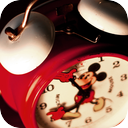(short preview of full seamless looping track)
Wind Up Clock
This product is not available in the selected currency.
In Stock
Backordered
Out of Stock
Description
The wizened father of time takes one look at this clock and laughs, knowing that there is a divine comedy to the false sense of power and silly twisted reality that this kind of clock can give the naive human being. Only he can turn the wheels of time and take creation from place to place, persisting beyond the limits of a few mechanical gears, and making the world into a timepiece that needs no human hand to keeps its engine moving. None of the first clocks survived from 13th century Europe, but various mentions in church records reveal some of the early history of the clock. The word clock (from the Latin word clocca, "bell"), suggests that it was the sound of bells which also characterized the prototype mechanical clocks that appeared during the 13th century in Europe. Outside of Europe, the escapement mechanism had been known and used in medieval China, as the Song Dynasty horologist and engineer Su Song (1020–1101) incorporated it into his astronomical clock-tower of Kaifeng in 1088. However, his astronomical clock and rotating armillary sphere still relied on the use of flowing water, while European clockworks of the following centuries shed this old method for a more efficient driving power of weights, in addition to the escapement mechanism. A mercury clock, described in the Libros del saber, a Spanish work from AD 1277 consisting of translations and paraphrases of Arabic works, is sometimes quoted as evidence for Muslim knowledge of a mechanical clock.
Opps
Sorry, it looks like some products are not available in selected quantity.



